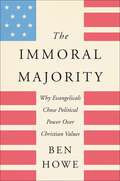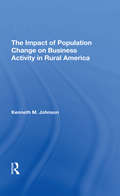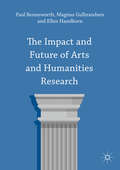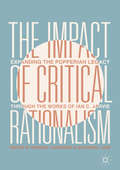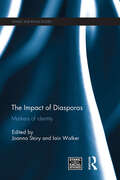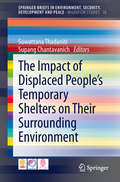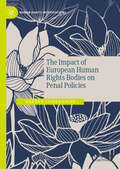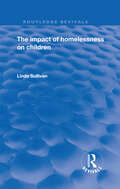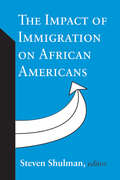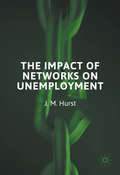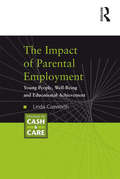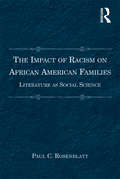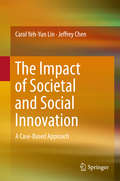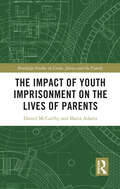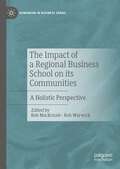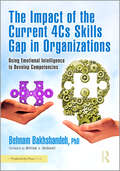- Table View
- List View
The Immigrant Advantage
by Claudia KolkerDo you have a relative or friend who would gladly wait on you, hand and foot, for a full month after you had a baby? How about someone to deliver a delicious, piping hot home-cooked meal, just like your mother's, right to your front door after work? Do you know people you'd trust enough to give several hundred dollars a month to, with no receipt, on the simple promise that the accumulated wealth will come back to you a year later? Not many of us can answer "yes" to these questions. But as award-winning journalist Claudia Kolker has discovered, each of these is one of a wide variety of cherished customs brought to the United States by immigrant groups, often adapted to American life by the second generation in a distinctive blending of old and new. Taken together, these extraordinary traditions may well contribute to what's known as "the immigrant paradox," the growing evidence that immigrants, even those from poor or violence-wracked countries, tend to be both physically and mentally healthier than most native-born Americans. These customs are unfamiliar to most Americans, but they shouldn't be. Honed over centuries, they provide ingenious solutions to daily challenges most of us face and provide both social support and comfort. They range from Vietnamese money clubs that help people save and Mexican cuarentenas--a forty-day period of rest for new mothers--to Korean afterschools that offer highly effective tutoring at low cost and Jamaican multigenerational households that help younger family members pay for college and, eventually, their own homes. Fascinated by the success of immigrant friends, Claudia Kolker embarked on a journey to uncover how these customs are being carried on and adapted by the second and third generations, and how they can enrich all of our lives. In a beautifully written narrative, she takes readers into the living rooms, kitchens, and restaurants of immigrant families and neighborhoods all across the country, exploring the sociable street life of Chicago's "Little Village," a Mexican enclave with extraordinarily low rates of asthma and heart disease; the focused quiet of Korean afterschool tutoring centers; and the loving, controlled chaos of a Jamaican extended-family home. She chronicles the quests of young Indian Americans to find spouses with the close guidance of their parents, revealing the benefits of "assisted marriage," an American adaptation of arranged marriage. And she dives with gusto into some of the customs herself, experimenting to see how we might all fit them into our lives. She shows us the joy, and excitement, of savoring Vietnamese "monthly rice" meals delivered to her front door, hiring a tutor for her two young girls, and finding a powerful sense of community in a money-lending club she started with friends. The Immigrant Advantage is an adventurous exploration of little-known traditional wisdom, and how in this nation of immigrants our lives can be enriched by the gifts of our newest arrivals.
The Immigrant Advantage: What We Can Learn from Newcomers to America about Health, Happiness and Hope
by Claudia KolkerDo you have a relative or friend who would gladly wait on you, hand and foot, for a full month after you had a baby? How about someone to deliver a delicious, piping hot home-cooked meal, just like your mother's, right to your front door after work? Do you know people you'd trust enough to give several hundred dollars a month to, with no receipt, on the simple promise that the accumulated wealth will come back to you a year later? Not many of us can answer "yes" to these questions. But as award-winning journalist Claudia Kolker has discovered, each of these is one of a wide variety of cherished customs brought to the United States by immigrant groups, often adapted to American life by the second generation in a distinctive blending of old and new. Taken together, these extraordinary traditions may well contribute to what's known as "the immigrant paradox," the growing evidence that immigrants, even those from poor or violence-wracked countries, tend to be both physically and mentally healthier than most native-born Americans. These customs are unfamiliar to most Americans, but they shouldn't be. Honed over centuries, they provide ingenious solutions to daily challenges most of us face and provide both social support and comfort. They range from Vietnamese money clubs that help people save and Mexican cuarentenas--a forty-day period of rest for new mothers--to Korean afterschools that offer highly effective tutoring at low cost and Jamaican multigenerational households that help younger family members pay for college and, eventually, their own homes. Fascinated by the success of immigrant friends, Claudia Kolker embarked on a journey to uncover how these customs are being carried on and adapted by the second and third generations, and how they can enrich all of our lives. In a beautifully written narrative, she takes readers into the living rooms, kitchens, and restaurants of immigrant families and neighborhoods all across the country, exploring the sociable street life of Chicago's "Little Village," a Mexican enclave with extraordinarily low rates of asthma and heart disease; the focused quiet of Korean afterschool tutoring centers; and the loving, controlled chaos of a Jamaican extended-family home. She chronicles the quests of young Indian Americans to find spouses with the close guidance of their parents, revealing the benefits of "assisted marriage," an American adaptation of arranged marriage. And she dives with gusto into some of the customs herself, experimenting to see how we might all fit them into our lives. She shows us the joy, and excitement, of savoring Vietnamese "monthly rice" meals delivered to her front door, hiring a tutor for her two young girls, and finding a powerful sense of community in a money-lending club she started with friends. The Immigrant Advantage is an adventurous exploration of little-known traditional wisdom, and how in this nation of immigrants our lives can be enriched by the gifts of our newest arrivals.
The Immoral Majority: Why Evangelicals Chose Political Power Over Christian Values
by Ben HoweAn analysis of why and how the Religious Right could vote for Donald Trump in 2016, and how the movement can redeem itself and get back on track.In 2016, writer and filmmaker Ben Howe found himself disillusioned with the religious movement he’d always called home. In the pursuit of electoral victory, many American evangelicals embraced moral relativism and toxic partisanship.In The Immoral Majority, Howe—still a believer and still deeply conservative—analyzes and debunks the intellectual dishonesty and manipulative rhetoric that evangelical leaders use to convince Christians to toe the Republican Party line. He covers the history of the Christian Right, as well as the events of the last three decades that led to the current state of the conservative movement at large.As long as evangelicals prioritize power over persuasion, Howe argues, their pews will be empty and their national influence will dwindle. If evangelicals hope to avoid cultural irrelevance, it means valuing the eternal over the ephemeral, humility over ego, and resisting the seduction of political power, no matter the cost. The Immoral Majority demonstrates how the Religious Right is choosing the profits of this world at the cost of its soul—and why it’s not too late to change course.
The Impact Of Population Change On Business Activity In Rural America
by Kenneth M JohnsonDr. Johnson moves beyond the existing literature on rural-urban population shifts during the past forty years to examine the effects of those shifts on the business infrastructure that supplies goods and services to rural areas in the United States. First establishing a historical demographic context to serve as a backdrop, he provides a detailed longitudinal treatment on the linkage between population change and the rural commercial infrastructure, as well as timely information on the impact of the recent rural population turnaround on business. Some of his findings, based on the latest data available, refute earlier expectations that a decrease in population necessarily leads to a decline in the local business community.
The Impact and Future of Arts and Humanities Research
by Paul Benneworth Magnus Gulbrandsen Ellen HazelkornDrawing on original international research by a cross-European social science team, this book makes an important contribution to the discussion about the future of arts and humanities research. It explores the responses of these fields to the growing range of questions being asked about the value, impact and benefit of publicly-funded research. The objective is to better understand what really matters rather than what is easily measured. The book increases our understanding of the contribution which university-based arts and humanities research makes to society and the economy by exploring how it is defined, appreciated and accounted for by researchers, policymakers and civil society. It identifies appropriate practices and methodologies to assess and demonstrate quality and value beyond the academy. The book will be essential reading for researchers and policymakers, as well as research organisations and anyone interested in the arts and humanities.
The Impact of COVID-19 on India and the Global Order: A Multidisciplinary Approach
by Zakir Husain Mousumi Dutta Anup Kumar SinhaThis book provides a multidisciplinary analysis of the many socio-economic challenges posed by COVID-19 pandemic across international boundaries, disrupting the economic system and life styles globally. It starts by setting the historical context of the pandemic and proceeds to describe the impact on the Indian economy, how certain sections of the population have become economically and psychologically vulnerable. International experts from diverse fields—development economics, macroeconomics, corporate finance, history, sociology, psychology, public policy, and urban studies—contribute to this exciting analysis of an Indian and global society at the crossroads. The book examines emerging themes related to global economic revival, intellectual property rights over the vaccine, and rupturing of the global supply chains. It discusses the response of institutions and markets to the global pandemic. It closes with a futuristic look at the new society and global system that may emerge out of the chaos. A valuable resource appealing to a wide readership across the social sciences and the humanities. Readers include undergraduate students, postgraduate students, researchers and academic teachers, and also public policy experts.
The Impact of Critical Rationalism: Expanding the Popperian Legacy through the Works of Ian C. Jarvie
by Raphael Sassower Nathaniel LaorAs a student and disciple of Karl Popper and longtime managing editor of Philosophy of the Social Sciences, Ian C. Jarvie extended the notion of Critical Rationalism to be useful in anthropology, aesthetics, film studies, and various social sciences. In this Festschrift, contributors from a range of interests and disciplines engage with the Popperian legacy and Jarvie’s scholarly and editorial work in Critical Rationalism to contextualize it in the broader, contemporary intellectual landscape. These original essays not only honor Jarvie’s legacy, but expand it to cross the philosophical divide between analytic and continental schools of thought. In so doing, the authors bring the state-of-the-art achievements of Critical Rationalism to the forefront of current academic debates.
The Impact of Diasporas: Markers of identity (Ethnic and Racial Studies)
by Joanna Story Iain WalkerMarkers of identity define human groups: who belongs and who is excluded. These markers are often overt – language, material culture, patterns of behaviour – and are carefully nurtured between generations; other times they can be invisible, intangible, or unconscious. Such markers of identity also travel, and can be curated, distilled, or reworked in new lands and in new cultural environments. It has always been thus: markers of identity are often central to the ties that bind dispersed, diasporic communities across lands and through time. This book brings together research that discusses a very wide range of scholarly approaches, periods, and places – from the Viking diaspora in the north Atlantic, and Anglo-Saxon treasure hoards, to what DNA can and cannot reveal about human identity, to modern, multicultural Martinique, East London, and urban Africa, and the effect of the absence of geopolitical identity, of statelessness, among the Roma and Palestinians – to better understand how markers of identity contribute to the impact of diasporas. This book was originally published as a special issue of Ethnic and Racial Studies.
The Impact of Displaced People's Temporary Shelters on their Surrounding Environment
by Supang Chantavanich Suwattana ThadanitiThis book is one of four volumes on a major empirical migration study by leading Thai migration specialists from Chulalongkorn University (Bangkok) for the United Nations Development Programme (UNDP). this volume discusses the environmental impact of temporary shelters for displaced people along the Thai-Myanmar border. Of nine shelters, three were selected for detailed study: Ban Tham Hin (Ratchaburi province), Ban Mai Nai Soi (Mae Hong Son province), and Ban Mae La (Tak province). For each shelter, various research methods were used to assess the environmental conditions, analyse the ways of living and use of resources by displaced persons, and disclose their perceptions of the environmental conditions they face. The environmental impact of the shelters on the surrounding areas were also assessed by listening to officials and representatives. The book provides realistic policy recommendations for a durable solution for refugees at the borders. Practitioners and policymakers from governments, international organizations and NGOs will benefit from its findings. The volume is also helpful for anyone studying forced migration and its denouement in the age of globalization.
The Impact of EU Politicisation on Voting Behaviour in Europe (Palgrave Studies in European Union Politics)
by Marina Costa LoboThis open access book focuses on the importance that EU politicization has gained in European democracies and the consequences for voting behaviour in six countries of the EU: Belgium, Germany, Greece, Ireland, Portugal and Spain. Most of the studies which research the way the EU is being legitimised focus on the European Parliament elections. In this book we argue that to understand how EU accountability works, it is necessary to focus instead on national elections and the national political environment. Through a detailed, multimethod analysis this book establishes rigorously the paths of European accountability at the national level, its propitious contexts in the media and parliamentary debates, and whether the paths are similar from Greece to Germany. The findings have implications for both national and European Union democracy, underlining the importance that national institutions have in enabling citizens to hold the EU accountable.
The Impact of European Human Rights Bodies on Penal Policies (Human Rights Interventions)
by Gaëtan CliquennoisA new framework for penal and prison policies in Europe has been progressively established by the European Court of Human Rights (ECtHR), the Council of Europe (CoE) and the European Union (EU) to protect the human rights of detainees in Europe. European countries have reacted in very diverse ways to this influence. This book looks at the evolving content of case law and European Standards and their effects through a range of national reactions, processes and policies in different European countries.
The Impact of European Integration on West European Politics: Committed Pro-Europeans Strike Back (Palgrave Studies in European Union Politics)
by Luca CarrieriThis book analyses emerging trends in the politicisation of EU conflicts in Western Europe between 2006 and 2019, evaluating the transformative effects arising from multiple crises – the Euro crisis, the migration crisis and the Brexit Referendum. It describes how EU issues have been increasingly emphasised and polarised by various political parties – both the mainstream pro-EU and anti-EU protest parties – and have been transformed into more meaningful determinants of voting. The respective chapters investigate the fluctuations in EU issue entrepreneurship and EU issue voting, identifying which party types have been more likely to benefit from their EU issue proximity to voters, and assessing the growing politicisation of the EU conflict in both South European and North-Western countries. This book will be of particular interest to students and scholars of political parties, European politics, Euroscepticism and voting behaviour.
The Impact of Homelessness on Children
by Linda SullivanFirst published in 1997. Presents the views of nine children ages seven to eleven on homelessness and how it impacts their lives. All nine children resided in shelters, reported violent and disruptive events in their past, and did not consider themselves homeless citing the shelter as their home.
The Impact of ICT on Quality of Working Life
by Christian Korunka Peter HoonakkerThis book discusses the impact and effects of Information and Communication Technologies (ICT) on quality of working life of employees. It describes the changes and the acceleration of processes caused by the widespread use of ICT in a broad range of working areas and in different national contexts. It explores the important role ICT has come to play in nearly all work places in developed societies and the impact it is starting to have on work places in developing countries. The book brings together experts from the fields of ICT and quality of working life and from a variety of backgrounds and disciplines, including sociology, psychology, industrial engineering and macro ergonomics. It discusses the range of current positive and negatives effects as well as the possible increase of both kinds of effects in the future. The final chapter of the book integrates the diverse perspectives of the authors and gives recommendations on how to increase the possible positive outcomes and to diminish negative effects of ICT in an accelerated society.
The Impact of Immigration on African Americans
by Steven ShulmanImmigration has significant consequences for all Americans, but especially for African Americans.áThe sheer magnitude of immigration--it is the primary factor driving population growth--is so large that it directly or indirectly affects the economic, political, social, and environmental circumstances of most Americans.áBut the geographic concentration of immigrants in urban areas, and the economic concentration of immigrants in the low-wage sector of the labor market, have special consequences for African Americans since they are especially likely to live in urban areas and to be low-wage workers.These effects can be both negative and positive. Immigration has sharply increased the supply of labor into the low-wage sector of the labor market, which tends to reduce wages and employment opportunities for low-wage native workers. Employers may prefer hiring immigrants, who are perceived to be hard working and uncomplaining, to hiring African Americans. Immigrants can also increase the competition for scarce public services (especially education) on which African Americans depend. Yet immigration can also stimulate economic growth and urban revitalization, which can increase job opportunities and spread an ideology of multiculturalism. Immigration can dilute the political power of African Americans, but it can also strengthen the civil rights coalition. Immigration can benefit some groups while hurting others.This volume presents research and analysis that reflects and advances the debates about the economic and political consequences of immigration for African Americans. The contributors include Gerald Jaynes (Yale University), Vernon Briggs (Cornell University), Frank Bean and Jennifer Lee (University of California, Irvine), Robert Cherry (Brooklyn College), Manuel Pastor (University of California, Santa Cruz) and Enrique Marcelli (University of Massachusetts, Boston), Steven Camarota (Center for Immigration Studies), Frank Morris (University of Texas, D
The Impact of Networks on Unemployment
by J. M. HurstThis book investigates why networks, some with joined-up governance remits, appeared ineffective in handling neighbourhood unemployment even in periods when the national unemployment levels dropped. It deploys a multi-theoretical and methodological framework to investigate this empirical puzzle, and to test and analyse the causal factors influencing network outcomes. Chapters examine network concepts, network theories, outcome indicators, the historical infrastructure and management of unemployment policy, and governing network trends in post-war urban regeneration interventions. Comparative network case studies offer empirical evidence and a high degree of local variation. Mixed methods (qualitative and quantitative approaches), including social network analysis, uncover formal and informal networks, and eighty-six interviews in two English local authorities with persistent unemployment, give voice to network practitioner experiences. Findings explain why sub-optimal network outcomes prevail and operational difficulties persist on the ground. Students and academics, professionals and activists can use the results to challenge network governance theories and the policy status-quo.
The Impact of Parental Employment: Young People, Well-Being and Educational Achievement (Studies In Cash And Care Ser.)
by Linda CusworthIn this groundbreaking study, Linda Cusworth explores the impact of parental employment or unemployment on the educational and emotional well-being of their children. Using theoretical apparatus from Bourdieu and data from the youth survey of the British Household Panel Study, the research in this book analyzes the impact of parental employment on those born between 1978 and 1990. This study is unique in going beyond the educational achievement and later patterns of employment of the young people studied to look at the whole of children's lives, including their attitudes and aspirations, relationships and emotional well-being. The changed norms of maternal employment and the substantial increase in lone parenthood over the last few decades make this an especially important study both for academics in social and public policy and sociology, and for policy makers.
The Impact of Populism on European Institutions and Civil Society: Discourses, Practices, and Policies (Palgrave Studies in European Political Sociology)
by Carlo Ruzza Paolo Cossarini Carlo BertiWhat is the impact of populism on the EU? How did the EU institutions and civil society react to the recent rise of populist parties? To answer such relevant questions and understand populism in terms of ideas, political outcomes, and social dynamics, academia needs to engage with institutional actors, civil society organizations, and policy makers. By bringing together academics, members of European institutions and agencies, and leaders of civil society organizations, this edited volume bridges the gap between research and practice. It explores how populism impacted on European institutions and civil society and investigates their reactions and strategies to overcome the challenges posed by populists. This collection is organized into three main sections, i.e., general European governance; European Parliament and Commission; European organized civil society. Overall, the volume unveils how the populist threat was perceived within the EU institutions and NGOs and discusses the strategies they devised to react and how these were implemented in institutional and public communication.
The Impact of Racism on African American Families: Literature as Social Science
by Paul C. RosenblattIn spite of the existence of statistics and numerical data on various aspects of African American life, including housing, earnings, assets, unemployment, household violence, teen pregnancy and encounters with the criminal justice system, social science literature on how racism affects the everyday interactions of African American families is limited. How does racism come home to and affect African American families? If a father in an African American family is denied employment on the basis of his race or a wife is demeaned at work by racist slurs, how is their family life affected? Given the lack of social science literature responding to these questions, this volume turns to an alternative source in order to address them: literature. Engaging with novels written by African American authors, it explores their rich depictions of African American family life, showing how these can contribute to our sociological knowledge and making the case for the novel as an object and source of social research. As such, it will appeal to scholars and students of the sociology of the family, race and ethnicity, cultural studies and literature.
The Impact of Smart Feature Phones on Development: Internet, Literacy and Digital Skills (SpringerBriefs in Economics)
by Jeffrey JamesThis novel book, motivated by the recent introduction of a major innovation in information technology, explores the possibility of the Internet being made available to millions of poor people in developing countries, who are not yet connected. The new technology, known as a smart feature phone, is based on open-source software and otherwise designed for a low-income population. The purpose of this book is to examine the origins, spread and impact of this innovation. Much attention is paid to literacy and digital skills, which determine the benefits that are actually derived.
The Impact of Societal and Social Innovation
by Carol Yeh-Yun Lin Jeffrey ChenThis book elaborates on the distinction between societal innovation and social innovation. It provides eight case studies to illustrate the scope, process, outcome, and impact of societal innovation and social innovation. In addition, the book proposes a model for interested parties to maximize their contribution for the common social good in a systematic and effective way. Case studies are used to illustrate concepts for readers to grasp the real essence of the relatively abstract notions of societal innovation and social innovation. In doing so, the book shows how small efforts can bring big benefits for the under privileged and to society as a whole. This book serves as a helpful resource for government officials, social innovation practitioners, social entrepreneurs, Non Profit Organizations, as well as students who would like to contribute to the common social good.
The Impact of Youth Imprisonment on the Lives of Parents (Routledge Studies in Crime, Justice and the Family)
by Daniel McCarthy Maria AdamsIt has long been argued that families play a crucial role in helping support prisoners during and beyond their time in prison. Through harnessing material and emotional support offered through family, prisoners can have a stronger commitment to move towards prosocial pathways via these important social ties. Yet, often overlooked are the experiences of families themselves in providing support for prisoners. This book focuses on parents whose adolescent male children are sent to prison. Charting many of the adversities which parents face – from violence, psychological stress, to stigma and shame – the book provides one of the first empirical assessments of the ways parents manage the consequences of serious crime and navigate relationships with their children in prison. As well as documenting major social hardships of imprisonment, the book will also assess the heterogeneous impacts on relationships between parents and their male children, including cases where relationships may improve or worsen over the sentence. With sensitivity to issues of gender, ethnicity and inequality in families, this book sheds new light on many of the problems of youth crime and presents a highly topical insight into the effects of imprisonment on parents. An accessible and compelling read, this book will appeal to students and scholars of criminology, youth justice, sociology and all those interested in the role of families in supporting prisoners.
The Impact of a Regional Business School on its Communities: A Holistic Perspective (Humanism in Business Series)
by Bob MacKenzie Rob WarwickThe place and impact of large, elite business schools is hotly debated. Compared to such establishments, little has been written about smaller, regional, community-oriented business schools that serve and interact with their various communities at home or abroad.Focusing on one of the smaller regional business schools in the UK, and incorporating perspectives from further afield, this book seeks to redress that balance. This local focus enables a more holistic understanding of what really goes on in terms of the complex relationships, practices, challenges and contexts at play in such an arena. The book, conceived throughout the Covid-19 pandemic, reverberates with a multiplicity of voices, perspectives and narratives, and reflects a process of collaborative autoethnography and critical friendship. It will be of great value to academics, students and others who are interested in optimising the benefits of regional business schools around the world.
The Impact of a Sense of Belonging In College: Implications for Student Persistence, Retention, and Success
by Gavin W. Henning Erin M. Bentrim"Over the last 10 years, colleges and universities have started grappling with the notion that their approaches to maintaining and increasing student retention, persistence, and graduation rates were no longer working. As focus shifted to uncovering barriers to student success while concurrently recognizing student success as more than solely academic factors, the term "student sense of belonging" gained traction in both academic and co-curricular settings. The editors brought this book into being to serve as a single point of reference in an emerging and promising field of study"-- Provided by publisher.
The Impact of the Current 4Cs Skills Gap in Organizations: Using Emotional Intelligence to Develop Competencies
by Behnam BakhshandehThe shortage of skills in the workforce is one of the major problems facing enterprises today. How American businesses and organizations intend to deal with these issues and operate in a global market under strong competition is one of their primary worries. The only logical and tangible solution to this issue is for the educational system and major businesses and organizations to begin making investments in educating more children and young adults in soft skills like the 21st-century 4Cs skills (critical thinking, communication, creativity, and collaboration) to prepare them to meet the challenges of emerging businesses and technologies. The 21st century has witnessed a rapid transformation in the global workforce and the skills required to thrive in it. Traditional knowledge-based skills alone are no longer sufficient to succeed in today’s complex and dynamic business environment. Instead, organizations increasingly value what is known as the "4Cs" skills: communication, collaboration, critical thinking, and creativity. However, a significant skills gap exists, where many employees lack these crucial abilities. This book explores the impact of the 21st-century 4Cs skills gap in organizations and how it affects their performance, innovation, and competitiveness. The 21st-century 4Cs skills gap poses a significant challenge for organizations across industries. The inability to communicate effectively, collaborate seamlessly, think critically, and foster creativity can hinder productivity, innovation, and competitiveness. As the business landscape continues to evolve, addressing this skills gap is not only a necessity but also a strategic imperative for organizations looking to thrive in the 21st century. Bridging the gap through training, recruitment, and a commitment to a learning culture will be essential for success in the increasingly complex and interconnected world of business.

